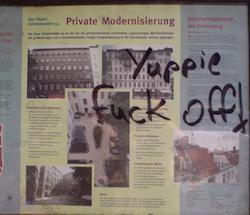Has Your City Been Marked For Death Yet?
Has Your City Been Marked For Death Yet?

Lately, “new Berlin” has become shorthand for an under-visited European city that is cheap, fun, and up-and-coming. Ever since creeping gentrification and a massive rise in tourism have thrown into question the German capital’s status of the world’s “coolest” city, people have been racing to determine its successor. Candidates besides Leipzig include Krakow (Poland), Vilnius (Lithuania), Belgrade (Serbia), Tallinn (Estonia), and Warsaw (Poland). They share, to varying degrees, many of the elements that made Berlin famous in the 1990s: affordability, empty buildings that can be repurposed and a sizeable arts scene. But unlike Berlin, they won’t have the opportunity to develop their cool reputation slowly — and are just as likely to be ruined by the hype as they are enriched by it.
Does your small-to-medium-sized city have underutilized industrial real estate and a recognizable arts scene? Then your city is at risk of becoming cool. Doomed cities don’t get to be cool; stable, healthy cities don’t get to be cool. The cities that are marked for coolness are the ones with rich, varied potential — cities in some form of recovery, with uncertain but hopeful futures. For these cities, there may be no worse fate: Coolness is a guarantee that your residents will be displaced, that your local identity will be smithed into a blunt Brooklynish object, that your economy will be flooded with but then drowned by an influx of capital that sees your locale as a magical new asset class for which popping is a self-fulfilling prophesy. A passing mention in the right place at the right time — a casual “new Berlin” spoken here or written there — is an explicit threat to make a city’s residents tourists in their own homes. This doesn’t turn out well for the new residents, either: They’re an unwitting part of the plan, a mechanism through which outside investments are protected and multiplied. Once the city is flipped, their services are no longer required. They are then left with strangely high rents and the creeping feeling that they never really understood why they wanted to move in the first place.
Photo by domat33f
